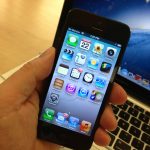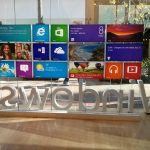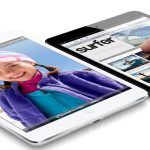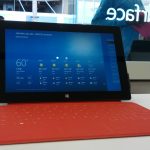Apple holds on to U.S. Smartphone subscriber lead

In the highly saturated U.S. smartphone market, Apple's dominance grew, while iPhone nipped upwards towards Android, for the three months ended in January, according to comScore. The analyst firm, unlike most of its competitors, measures actual subscriber share rather than number of units shipped. Like Gartner's counting actual sales, comScore gives a clearer view of real-world dynamics.
During iPhone 5's first full three months of sales, Apple's share reached 37.8 percent -- up from 36.3 percent in December and 34.3 percent in October. By comparison, second-place Samsung nudged up to 21.4 percent share, from 21 percent sequentially and 19.5 percent for the same three months. HTC, Motorola and LG followed, with respective shares of 9.7 percent, 8.6 percent and 7 percent. All three lost share from December, with LG up ever-so slightly from October. Motorola's loses strongly suggest that at Verizon, carrier with the highly-visible Droid line of smartphones, subscribers shift allegiance to other brands. Good thing Moto has a new evangelist.
Google+ gets a BIG profile makeover

Funny how little things matter to people. Today Google announced some minor changes to profile pages on its social network, which include much bigger cover photos -- up to 2120 by 1192 pixels and displayed in 16:9 format. The search giant is rolling out this and other tweaks, gradually. If you don't see them already, you will soon.
Visually, Google+ Profiles lay out information in card-like fashion, which starkly remind of those Google Now presents on smartphones and tablets. The motif is particularly striking in new tab, Reviews, which doesn't appear in my Profile. Perhaps because I've written none.
Microsoft caves on Office 2013 usage rights, kind of

See, if enough people complain and bloggers and journalists write enough misinformed, sensational stories, image-conscious Microsoft goes into public relations damage control. That's the case with Office 2013, which gets new licensing terms that grant you the right to move the software to another PC.
Under the old agreement, Microsoft used activation technology to bind the productivity suite to one computer. The software couldn't be transferred. The restriction comes with another nick, which isn't changed: With this version, Microsoft takes away generous multi-PC rights available with older versions. Like I expressed in late January, "Microsoft really doesn't want you to buy Office 2013" but subscribe with Office 365 instead. Nothing is changed, there. Today's concession is all PR blush.
Automattic temps bloggers with WordPress.com Business

Automattic has a new premium WordPress.com option that just might be right for many small businesses and entrepreneurial types. The blogging service today announced a $299 per-year plan that includes your domain (rather than, say, poopydiapersdontstink.wordpress.com); access to advanced design tools and fonts; unlimited premium themes (which otherwise cost separately); photo and video uploads and galleries; unlimited storage, supporting those photos and videos; live support (yes, real people); and no WordPress placed ads (which appear on free sites).
I don't blog personally anymore -- just BetaNews or Google+ posts now -- but still pay a reputable hoster 20 bucks a month to keep my WordPress site and archive active. For $60 a year extra, I could get a whole lot more and all the other benefits the blogging service offers, such as WordPress.com promotion, following and sharing.
How I came to love Windows again

Two words: Surface Pro. For most of February, I used Microsoft's Windows 8 Pro tablet as my primary PC and loved the experience.
I haven't felt so good about using a Microsoft operating system for a decade. Actually, I've never felt like this. Windows 8 Pro is simply amazing when experienced on the right device, and starting point is touch. Modern UI really works for me. Windows 8's visuals are stunning, making a truly satisfying and fun place to work. I enjoy working on Windows 8, which pretty UI beckons me to come back again and again.
PC shipments go from worse to, well, you don't want to know

IDC sure knows how to ruin a Monday. The analyst firm released final personal computer shipment tabulations for fourth quarter and all 2012 and made a dismal forecast for this year. If you're as tired of reading "PC is dead" stories as I am writing them, cover your eyes. Read no further. The horrors ahead are unbearable.
Global shipments will decline for the second year in a row in 2013, with Windows 8 giving no perceptual lift at all. Holidays were a bust, as will be the year. You can't fault Microsoft for trying, but there is only so much water you can throw off a sinking ship with buckets before it plunges beneath the waves. Perhaps only the rumored Windows Blue can save the PC now, but Win8 was supposed to do that -- and look what happened. When an analyst firm uses "underwhelming reception" to describe a Microsoft operating system, it's time to abandon ship.
Smartphone shipments surge ahead of lesser mobiles -- Brazil, China and India lead the way

Last month after analyzing Gartner's Q4 handset sales data, I quipped: "At this pace, smartphone sales should surpass feature phones within a couple quarters". Today, IDC released a real forecast, claiming that smartphone shipments would do just that. While not exactly sales, the change would mark a significant shift in the mobile phone market, with China charging ahead of all other countries.
The analyst firm expects smartphone shipments to nudge past 50 percent for the year, a forecast I consider to be overly conservative. Based on sales, the category already has 44 percent share, according to Gartner. The smartphone market is so fast-changing, few analysts get anything right. As I explained in December, IDC repeatedly underforecast smartphone shipments throughout 2012. The general view is likely right, but with feature phones falling at brisker pace.
Can Guy Kawasaki save Google from Samsung?

Google is a hardware company now, something that is too often overlooked. Last week, the search and information company launched its first computer, Chromebook Pixel, which I reviewed overnight yesterday. In August 2011, Google bought Motorola, one of the most iconic American brands and inventor of the cell phone, for $12.5 billion; the deal closed in May 2012. Moto makes handsets and tablets, among other things.
But Motorola is a brand in decline, and one Google should want to reinvigorate if the plan is to release more-compelling, more-innovative Androids. Why should ASUS, LG and Samsung manufacture Nexus devices when Google has a huge hardware subsidiary? Meanwhile, one of the three is a partner out of control. Samsung threatens to fracture the broader Android ecosystem -- a problem I sternly warned about in April 2012 post "Google has lost control of Android". A resurgent Motorola could bring unity back to the Force, as the saying goes. Google bets that Guy Kawasaki can help make that happen.
Judge denies Apple request to increase damages against Samsung, cuts them by 40 percent instead

Apple's patent case against Samsung took an unexpected turn today. Judge Lucy Koh cut the damages, citing jury errors, removing some devices previously found to infringe the fruit-logo company's patents. Jurors had awarded about $1.05 billion in damages, which now are just $600 million (rounded up slightly). The South Korean electronics giant isn't off the hook by any means. More than a dozen devices remain infringers.
Judge Koh's order is a blow to Apple, but not one that invalidates any real part of its patent victory. The judge found that the jury had inappropriately calculated damages for some products, based in part on their acceptance of arguments made by Apple expert witness Terry Musika.
Apple's mini is more popular than iPad, and that's not a good thing

Nearly two months ago, when forecasting that tablets would outsell laptops this year, NPD DisplaySearch dropped dirty data bomb: shipments of slates with 7-7.9-inch screens will eclipse larger ones. Now the analyst firm puts real numbers behind the prediction, and they are grim for Apple. Talk about mixed blessings. iPad mini sizzles, while iPad fizzles. The problem: Higher sales of one takes away from the other, rather than expands demand. As such, margins are lower for the important category, likely biting Macs, too.
Panel shipments reveal the trend, and it is dramatic in just one month. "Shipments of 9.7-inch tablet PC panels collapsed, falling from 7.4 to 1.3 million, while 7-inch and 7.9-inch panel shipments grew rapidly, from 12 to 14 million", David Hsieh, NPD vice president, says. "Shipments of 10.1-inch panels grew only slightly" from December to January. Apple and Sony are the major manufacturers selling 9.7-inch tablets, the overwhelming majority iPad. Starting today, Sony sells the Xperia Tablet Z, in a move to 10.1 inches, but 9.7-inch volumes aren't high enough to account for such a dramatic shift in panel orders.
Is Chromebook Pixel worth spending $1,299? [first-impressions review]
First in a series. Chromebook Pixel is an enigma. A misfit. Some critics call it a miscalculation -- that Google created a pretty kit that offers too little value for the high price. For sure, $1,299, or $1,449 for the model with LTE, is more than most people pay. According to NPD, the average selling price of laptops at US retail was $640 in January.
But some people do pay more. Apple laptops start at $999 and, according to NPD, the ASP was $1,419 last month. Unquestionably, I see Chromebook Pixel as priced against Macs, and after using Google's laptop see it targeted at the same professionals who value Apple notebooks. The question any potential buyer should ask: Is Pixel worth spending as much as Google asks? I will answer that question in several parts -- this initial review is first.
500px foreshadows Chromebook Pixel's future

Today, 500px launched a new Chrome web app that, while available for browsers running on OS X or Windows, brings something extra to Chrome OS: Touch natively-supported and optimized for Chromebook Pixel. Take a look, because this little ditty is the computer's future and hints at what Google means by the "For what's next" marketing tagline.
Chromebook Pixel is Google's pricey -- $1,299 or $1,449 laptop running Chrome OS. Pixel's naysayers -- and, whoa, there are many -- gripe about a high-priced browser PC that is useless offline and for which there are no real programs. But that's not so. Developers can, as Google has done, create "packaged" web apps that can run when disconnected from the Internet. The 500px Chrome app is one of them. Then there is the functionality fine-tuned to Chrome Pixel's magnificent 2560 x 1700 resolution touchscreen. If you can understand 500px, you might grok Google's plans for making the Chrome OS flagship truly competitive with Mac notebooks.
Promises, promises -- more stores will sell Microsoft Surface

The biggest problem with Microsoft Surface is you probably can't buy it. The model running Windows RT is available in just 20 countries, and Pro even fewer (say, how do you like them Canada and United States). Today, Microsoft promised expansion into new geographies starting in late March, and, get this, taking several months. I can't imagine why tell us all now, other than perhaps to remind everyone that Surface exists and to keep those wanting one hanging on instead of buying something else.
Surface RT is currently available online or in stores: Australia, Austria, Belgium, Canada, China, Denmark, Finland, France, Germany, Hong Kong, Ireland, Italy, Luxembourg, the Netherlands, Norway, Portugal, Spain, Sweden and Switzerland, United Kingdom and United States. Microsoft added 13 on February 14. The months long expansion will bring the tablet to Japan, Mexico, New Zealand, Russia, Singapore and Taiwan.
Kindle for iOS is safe now, ah, we think

How could I resist something like this? A bug in Amazon Kindle for iOS 3.6.1 de-registers the iPad or iPhone, deleting all content and settings from the device. Because of the iTunes Store review process, Amazon resorts to posting a warning that existing customers shouldn't install the app. What's wrong with this picture? That's my question for you, oh faithful, snarky commenters (surely you have words for me, too -- ouch).
Amazon's app note: "There is a known issue with this update. If you are an existing Kindle for iOS user, we recommend you do not install this update at this time". That was hours and days ago. Today, Amazon bumped up the app to v3.6.2, which supposedly resolves the problem. I don't have an iOS device, so would you mind checking for us all please -- lab rat in the Kindle Store.
Google+ Sign-In is a Facebook killer

Single sign-on. Universal log-in. It is the Holy Grail of Internet services. Coming into the new century, Microsoft planned to use Passport as a universal, single sign-on authentication system aligned with Windows. Following privacy group complaints, a Federal Trade Commission investigation and subsequent settlement, Microsoft backed off the authentication strategy. A decade later, Facebook emerged as contender; many sites or services request, and some even require, signing in with Facebook credentials. Twitter is another option, and there are other choices, such as OpenID.
Now Google comes calling, today adding Google+ Sign-In as an option developers can include with their apps. I cannot overstate just how bold and disruptive the authentication system could be, or how much Google could -- scratch that, most likely will -- benefit. If widely adopted, the service could, if nothing else, give Google+ huge lift against Facebook. Welcome to the social network wars, and my money is on the the big G winning because Android, search and other assets offer so much leverage.
Joe's Bio
Joe Wilcox is BetaNews executive editor. His motto: Change the rules. Joe is a former CNET News staff writer, JupiterResearch senior analyst, and Ziff Davis Enterprise Microsoft Watch editor.
Ethics StatementBetaNews, your source for breaking tech news, reviews, and in-depth reporting since 1998.
© 1998-2025 BetaNews, Inc. All Rights Reserved. About Us - Privacy Policy - Cookie Policy - Sitemap.
